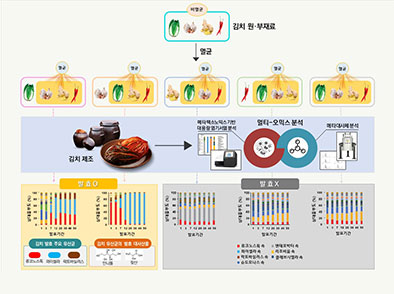Research Library
A hub of global Kimchi culture and the science of fermentation.
World lnstitute of Kimchi

Research Library
2025
-
Identification of the dominance mechanism of kimchi starter cultures and establishment of scientific criteria for next-generation starters
For the first time worldwide, Wikim has identified the biological mechanism by which its self-developed kimchi starter cultures (WiKim32, WiKim33 and WiKim0121) outcompete other lactic acid bacteria and become dominant in the early stages of kimchi fermentation. Using a multi-omics approach, the study revealed that the strains can rapidly generate energy (ATP), efficiently metabolise a wide range of carbohydrates, and survive and form colonies in low-temperature, acidic conditions. These findings will contribute to the development of scientific criteria for selecting high-performance next-generation kimchi starter cultures.
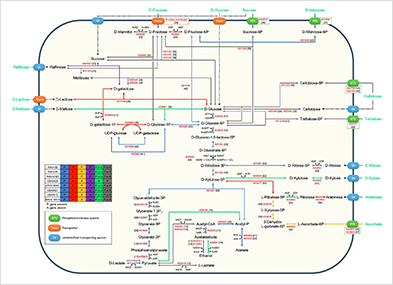
2024
-
First Human Trial Confirms Kimchi’s Anti-Obesity Effects
A study involving 55 overweight and obese adults (BMI 23–30 kg/m²) examined anthropometric measurements, blood biomarkers, and changes in the human gut microbiome. The results revealed that the kimchi-consuming group experienced a 2.6% reduction in body fat, an increase in the beneficial bacterium Akkermansia muciniphila, and a decrease in Proteobacteria, a bacterial group associated with obesity.
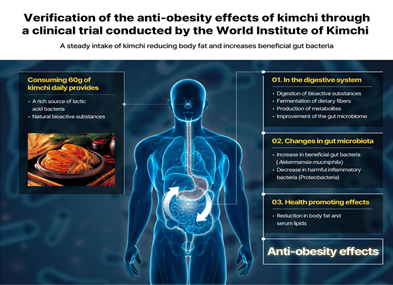
-
Development of a Non-Destructive Quality Inspection Dataset Using Artificial Intelligence (AI) for Each Stage of Kimchi Production
A comprehensive dataset comprising 270,000 entries was established, covering the entire kimchi production process—from raw baechu (kimchi cabbage) to salting and fermentation stages. RGB and hyperspectral images were collected and used to train AI models capable of evaluating key quality indicators at each stage: raw material quality (moisture content, sugar level), processing quality (salt concentration in salted cabbage), and ripeness of kimchi (pH, lactic acid bacteria count). These AI-powered models are expected to overcome the limitations of conventional quality control methods for commercial kimchi and contribute to enhanced production efficiency.
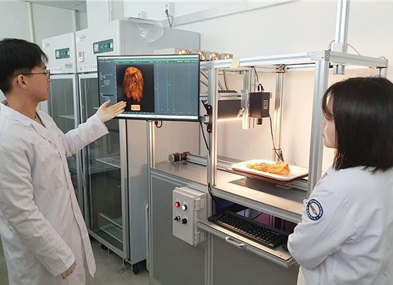
-
Development of Waste-to-Resource Technology Using Kimchi Microorganisms
A biological conversion process was successfully developed to extract bio-sugar from spent coffee grounds and convert it into high-yield lactic acid through fermentation using kimchi-derived microorganisms. This technology is expected to be applicable to by-products generated during the kimchi manufacturing process, such as outer cabbage leaves and radish peels. By utilizing these by-products as circular resources, the technology holds promise for reducing carbon emissions and lowering waste treatment costs.
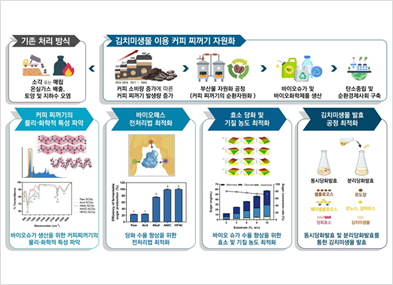
-
Development of Bio-Plastic Production Technology Using Agro-Food Byproducts
By employing bio-refactoring techniques, researchers engineered strains capable of producing biodegradable plastics. They optimized conditions for the enzymatic saccharification process, including enzyme and substrate concentrations, thereby achieving a sugar conversion rate of up to 90.4%. Moreover, for the first time worldwide, they confirmed that malic acid—one of the bioactive substances found in cabbage byproducts—contributes to enhanced productivity of polyhydroxyalkanoates (PHA), a biodegradable plastic.

2023
-
Discovers lactic acid bacteria strains with high virus resistance from kimchi
Researchers have isolated lactic acid bacteria (LAB) strains with high levels of resistance to phages from kimchi fermented at low temperatures for a long period of time. They have also identified the defense mechanism of the LAB strains against phages, viruses that infect and replicate within bacteria.
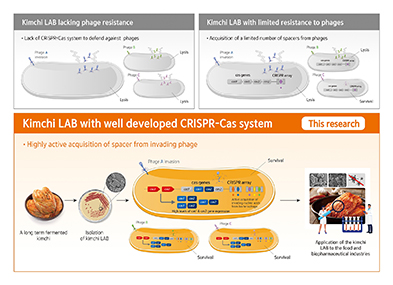
-
World’s First Cohort Analysis Reveals Anti-Obesity Effects of Kimchi
A 13-year analysis of dietary surveys and anthropometric measurements from the Korean Genome and Epidemiology Study (KoGES), a large-scale cohort dataset, has examined the relationship between kimchi consumption and obesity. The results show that individuals who consume kimchi two to three times daily (50g per serving) have a 15% lower body mass index (BMI) compared to those who consume less than one serving per day, suggesting that kimchi may help prevent obesity. Moreover, in obese men, kimchi intake was associated with an improvement in body weight.
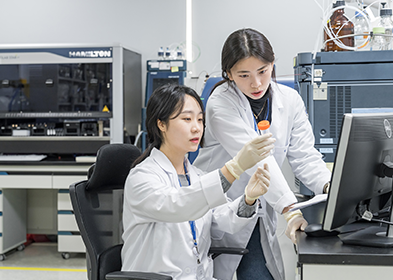
-
Development of a Kimchi Byproduct Crushing and Dehydration Processing System
A new device—the “Kimchi Byproduct Crushing and Dehydration Processing System”—has been developed to significantly reduce the moisture content and overall volume of cabbage and radish byproducts generated during the kimchi manufacturing process. This technology has been transferred to Turbozen Co., Ltd., a device manufacturer.
By employing this system, byproduct treatment costs can be reduced by over 60% compared to conventional methods, while also enhancing environmental benefits. As a result, the system is expected to improve the cost competitiveness of the kimchi industry, contribute to carbon neutrality, and support the establishment of a national resource circulation economy.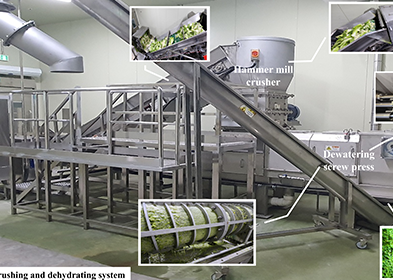
2022
-
Identification of the principle behind the improvement of obesity and neuroinflammation through the regulation of gut-brain axis by kimchi, the world's first
Identification of a new mechanism of action in which kimchi induces the growth of beneficial microbes in the gut, thereby improving obesity and obesity-induced neuroinflammation
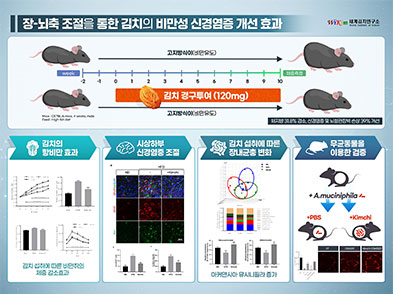
-
Developed real-time analysis technology for cabbage soft rot
Developed "hyperspectral imaging processing technology" that can analyze cabbage diseases, such as soft cabbage rot, in real-time.
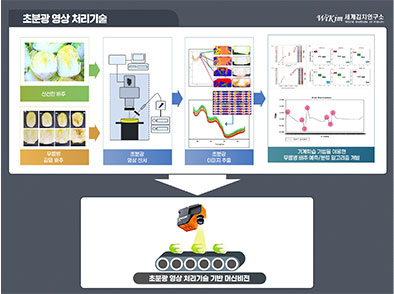
2021
-
Clarified the working principle of kimchi to improve obesity and neuroinflammation through regulation of the gut-brain axis for the first time in the world
Clarified that the various nutrients abundantly found in kimchi, along with the probiotics generated during the fermentation process, interact with Nrf2, an antioxidant system within the human body, to remove harmful reactive oxygen species caused by COVID-19.
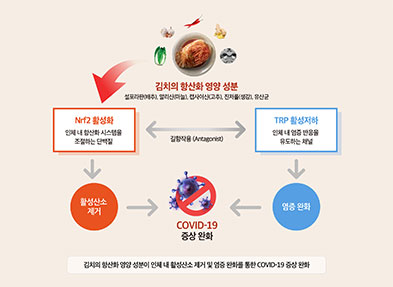
2020
-
Developed and commercialized an automated device for adding seasoning to kimchi
Developed and commercialized successfully a device for automated seasoning of kimchi as part of automating kimchi productionHourly production rate of Whole cabbage kimchi: (before) 280kg/hour → (after) 2,500kg/hour
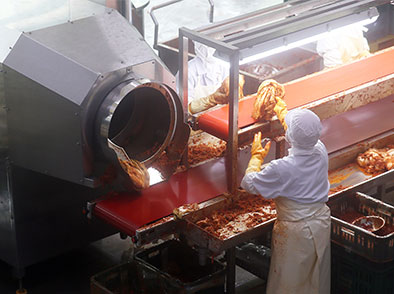
-
Developed technology to control airborne transmission of norovirus.
Controlled norovirus aerosols up to 99.9%, overcoming the limitations of gene analysis, using photocatalytic-based ultraviolet light-emitting diode (UV-LED) treatment technology
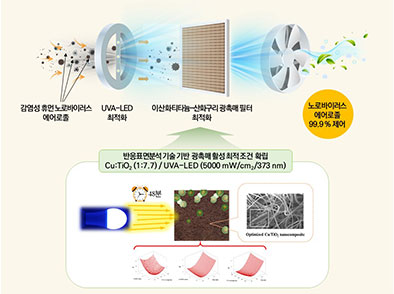
-
Developed a rapid analysis method for glucosinolate.
Using a colorimetric sensor (CSA), 10 types of glucosinolates that affect the bitter taste of kimchi can be rapidly analyzed within 2 hours, with a reliability level of 94% accuracy.
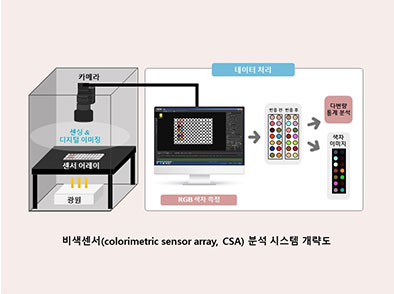
2019~2020
-
Development and technology transfer of functional probiotics derived from kimchi.
Development and technology transfer of 9 types of functional probiotics derived from kimchi, which have effects in improving anticancer, Parkinson's disease, fatty liver, and arthritis (total technology fee: KRW 8.9 billion). Top 10 Outstanding Results of the Year 2019.

2018~2021
-
Development of starter application process based on industry demand and commercialization of starter
Development of a kimchi taste-enhancing microbial starter and establishment of a distribution system to reduce starter production costs (from KRW 450,000/kg to KRW 70,000/kg), enabling 59 small and medium-sized kimchi manufacturers throughout the country to produce 14,779 tons of kimchi. Top 10 outstanding results of the year 2018. Top 100 outstanding results of national research and development projects in 2019.
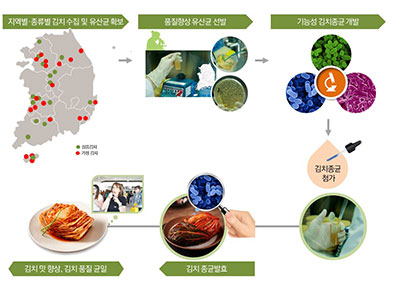
2018
-
Ensuring the hygiene and safety of kimchi.
Ensuring the hygiene and safety of kimchi by isolating yeast causing gas production in kimchi, confirming the toxicity and safety through genetic analysis, and developing an active norovirus discrimination method that complements the drawbacks of existing norovirus gene analysis methods.
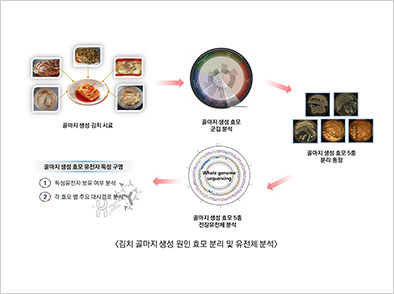
2017
-
Discovery and elucidation of the mechanism for the production of metabolites in kimchi fermentation.
The first discovery of HICA (3-hydroxyisocaproic acid), a functional substance from kimchi that has excellent immunomodulatory and antimicrobial activity, and the excavation of phenyllactic acid, which has superior antimicrobial activity. Evidence has been shown that as kimchi fermentation progresses and the pH decreases, gene expression related to fermentation metabolites is increased.
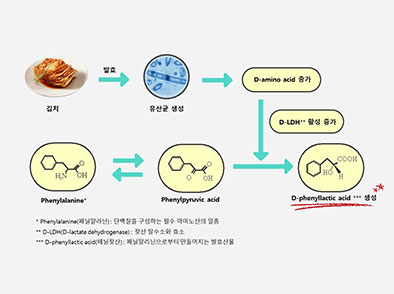
-
Elucidation of the fermentation characteristics of probiotics in kimchi and its raw materials.
Tracking the origin of probiotics induced during kimchi fermentation and elucidation of the fermentation characteristics of these probiotics. Deciphering the whole genomes and metatranscriptomes of three probiotics derived from kimchi, and identifying the reasons why the taste and aroma of kimchi change during the fermentation process.
